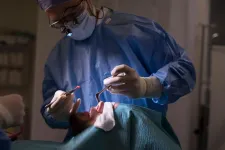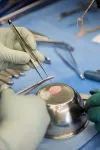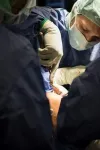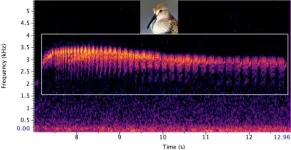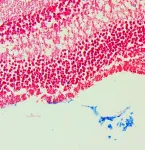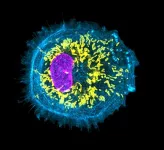(Press-News.org) The Department of Biomedicine at the University of Basel and the University Hospital Basel, today announced that it delivered the first surgical procedure to treat Osteoarthritis (OA) in humans. The procedure called Nasal Chondrocyte Tissue-Engineered Cartilage, or N-TEC, provides an innovative alternative to cure confined knee cartilage lesions as well as to address degenerative OA cases that have to date required knee joint replacements – prosthetics that routinely need replacing after 15-20 years.
The team at Basel is spearheading the next-generation human clinical trials that will take place at multiple sites across Europe, including Switzerland, Germany, Italy, Croatia, Sweden, Austria and Poland. The Swiss government and EU have awarded the N-TEC program $13.1 million in funding for these OA clinical trials – and the team is continuing to seek additional funding to expand these trials and deliver this promising regenerative OA treatment to joints other than knees. These clinical trials are open to qualified patients from around the world, including the United States.
According to the U.S. government, there are 2.5 million* joint replacement surgeries in the United States each year and even more patients are looking for alternatives to delay or avoid a prosthesis. Chondrocytes are the cell building blocks for cartilage and the University of Basel team is using them to grow new cartilage. Implantation of this tissue engineered cartilage graft in cartilage defects of the knee could represent an alternative for all patients that need more than simple pain management, but do not want a prosthesis. N-TEC is not appropriate for treating rheumatoid arthritis. The N-TEC current trials will focus only on patellafemeral OA, rather than full knee OA.
The N-TEC procedure was developed by an interdisciplinary research team headed by biomedical engineer Professor Ivan Martin, PhD, director of the Department of Biomedicine, and Dr. Marcus Mumme, MD, senior physician of orthopaedics at the University Children Hospital Basel.
Regenerative Medicine Real in the Clinic Today
Moving beyond trials in the lab and in animals, N-TEC has already taken regenerative medicine in cartilage injury treatment from a lab concept to real clinical success in humans. Leading an international clinical trial with five centres in Europe, the University of Basel team has successfully treated more than 100 patients for focal lesions – 2 to 8 cm2 dimensions – in the knee since 2012, and those patients have already returned to robust sporting activity, including skiing and running half marathons. Expanding beyond focal lesions six years ago, the University of Basel team treated two patients with advanced knee OA – patients who had been scheduled for knee joint replacement. Those patients, treated with N-TEC and correction of the leg axis, have reported beneficial outcomes (standardized, self-assessed questionnaires) and are still able to perform daily life activities six years postoperative, without the need to resort to artificial joint replacement.
Moving to address OA and cartilage defects in other joints, the University of Basel team is conducting human clinical trials focused on Patella-Femoral OA (PFOA) in the knee and cartilage lesions in the ankle and shoulder joints. They will kick off trials in the elbow joint in 2024.
“I’ve always been a very active, sporty person,” said 56-year-old Marlies Ruckstuhl of Basel, Switzerland. “A fall on ice damaged the cartilage in my left knee and left me with significant knee pain – and a compromised quality of life. Sports were out – and even sitting in my office chair was torture. I was told I needed a knee replacement. In May of 2017, I underwent the N-TEC procedure. After one year of structured physio therapy, I was back to running again, and I went skiing in the winter of 2018. Today, I am back to my old self, pain free and unrestricted – enjoying half marathons and trail running. Life is a pure joy again. A huge thank you to the team at Basel – Bravo!”
Nasal Cartilage – Extracting, Growing, and Attributes
N-TEC is an autologous procedure that relies on cartilage cells from each patient’s own body to grow new cartilage grafts that are surgically implanted to repair damaged cartilage in that patient’s joints. The team extracts a 7x7 mm segment of cartilage from the patient’s nasal septum, isolates and expands the cells, and then grows the cells on a collagen membrane in the lab to create a new engineered nasal cartilage graft of up to 40 cm2. It takes four weeks to grow the cartilage grafts in the lab. The cartilage harvesting from the nasal septum does not damage the patient’s nose.
Importantly, nasal cartilage is comprised of neural crest-derived cells – the type of cells that create higher functioning organs, such as the brain and eyes. These cells are superior to cells from other body parts in the regenerative capacity and in the so-called environmental plasticity – namely, the ability to adapt to different environments and conditions. In particular, nasal chondrocytes, even from older donors, can be reproducibly used to engineer N-TEC cartilage patches that possess structural and mechanical properties typical of articular cartilage tissues.
However, while replacing damaged cartilage in a joint is remarkable, it is not sufficient to fix joint degenerative conditions, such as OA. OA is associated with wear and tear in the joint, as well as with a significant amount of inflammation in damaged joints. That inflammation is a risk factor to break down new cartilage, as it did the original cartilage. In lab and animal experiments N-TEC nasal-engineered cartilage has been proven to possess anti-inflammatory attributes that resist damaging inflammation in repaired joints. N-TEC has also proven its durability in the treatment of OA knee cartilage conducted six years ago.
Surgical Procedure
The N-TEC graft is delivered to the joint in open surgery – and the team tailors the new cartilage graft in the operating theater to the shape and size of the cartilage defect. The surgeons suture the graft to the surrounding cartilage tissue. Subsequently, the cartilage integrates with the surrounding cartilage and subchondral bone. The patients are hospitalized for three to five days and the leg is immobilized for the first week post operation. Subsequently, the patients are walking with crutches for an additional six weeks, while the leg is mobilized and the range of motion increased. After one additional week, the patients put their full weight on the leg and continue physical therapy to strengthen the leg. The patient can return to light sports (no impact sports), such as swimming and cycling, after three months, and get back to full robust practices, including sports, after one year.
“N-TEC has demonstrated overwhelming success in human clinical studies to date,” said Ivan Martin, PhD, Professor of Tissue Engineering at the Department of Biomedicine, University of Basel and University Hospital Basel. “Thanks to generous public funding and cooperation with other outstanding teams, we will now extend clinical trials to investigate N-TEC in more challenging conditions so that someday it can become a mainstream bed-side procedure for many patients suffering from joint pain induced by cartilage loss.”
“The amazing N-TEC procedure is funded by grants from the Swiss National Science Foundation and the European Union – and private donors can step up to donate and accelerate N-TEC’s path to the bedside,” said Steve O’Keeffe, founder, Angry@Arthritis, a non-profit focused on attacking and eliminating osteoarthritis, headquartered in Alexandria, Virginia, in the United States. “When the doctor told me I had arthritis it felt like my life as I knew it was over. The team at the University of Basel are providing folks like us with new hope. They actually inspired me to set up Angry@Arthritis – and start my journey toward finding and funding cures for OA.”
Listen to Professor Ivan Martin talk about N-TEC on the Angry@Arthritis podcast – https://www.angryarthritis.org/podcasts/. Also available on major streaming platforms – Spotify, Apple, etc. You can donate to expand N-TEC clinical trials at https://www.angryatarthritis.org/.
* Advanced Research Projects Agency (ARPA-H) Novel Innovations for Tissue Regeneration in Osteoarthritis
END
University of Basel delivers first biological implants for treatment of cartilage lesions and osteoarthritis in humans
Swiss government and European Union award $13.1 million for next generation clinical trials – novel arthritis repair program actively recruiting for clinical trials
2023-11-15
ELSE PRESS RELEASES FROM THIS DATE:
From 2018 to 2022, eating disorder claim lines increased 65 percent nationally as a percentage of all medical claim lines
2023-11-15
NEW YORK, NY—November 15, 2023—From 2018 to 2022, eating disorder claim lines increased 65 percent nationally as a percentage of all medical claim lines.[1] All eating disorders studied increased during this period, but at different rates: avoidant/restrictive food intake disorder (ARFID) by 305 percent,[2] binge-eating disorder by 81 percent, anorexia nervosa (anorexia) by 73 percent and bulimia nervosa (bulimia) by 3 percent. These and other findings on eating disorders are reported in a FAIR Health white paper released today: Spotlight on Eating Disorders: An Analysis of Private Healthcare Claims.
Eating ...
NTU Singapore’s strength in research excellence sees it ranked 22nd globally and first in Singapore with most number of highly cited researchers
2023-11-15
Nanyang Technological University, Singapore (NTU Singapore) is up one spot to 22nd globally in this year’s Highly Cited Researchers list by Clarivate, a United Kingdom-based data company.
For the sixth year running, the University has the largest number of influential scientists among Singapore institutions recognised, with 42 NTU researchers that have significant and broad influence in their fields of research named.
These 42 scientists account for 44 mentions in the list, with two individuals recognised more ...
New study finds association between insecticide exposure and lower sperm concentration in adult men
2023-11-15
EMBARGOED until November 15, 2023
Contact: Michelle Thompson
George Mason University
mthomp7@gmu.edu
703-993-3485
New study finds association between insecticide exposure and lower sperm concentration in adult men
Comprehensive systematic review of 25 studies over nearly 50 years reveals consistent evidence of associations between insecticide exposure and lower sperm concentration
FAIRFAX, Va – Melissa J. Perry, Sc.D., MHS, dean of the George Mason University ...
New deep learning AI tool helps ecologists monitor rare birds through their songs
2023-11-15
Researchers have developed a new deep learning AI tool that generates life-like birdsongs to train bird identification tools, helping ecologists to monitor rare species in the wild. The findings are presented in the British Ecological Society journal, Methods in Ecology and Evolution.
Identifying common bird species through their song has never been easier, with numerous phone apps and software available to both ecologists and the public. But what if the identification software has never heard a particular bird before, or only has a small sample of recordings to reference? This is a problem facing ...
Study finds increasingly popular oral nicotine pouches do little to curb smokers’ cravings
2023-11-15
Oral nicotine pouches, a tobacco-leaf-free product marketed as an alternative to cigarettes, do little to curb current smokers’ nicotine cravings, according to a new study. Public health scientists with The Center for Tobacco Research at The Ohio State University Comprehensive Cancer Center – Arthur G. James Cancer Hospital and Richard J. Solove Research Institute report these findings in the medical journal Addiction.
Nicotine pouches are small pre-portioned bags filled with nicotine powder, flavorings, artificial sweeteners and other chemicals that extend shelf life. Marketed ...
More than 10% of samples from a stool-based colorectal cancer test may be unsatisfactory
2023-11-15
Bottom Line: Over 10% of fecal immunochemical tests (FIT) used for routine colorectal cancer (CRC) screening in a safety-net health system contained unsatisfactory samples that could not be processed.
Journal in Which the Study was Published: Cancer Epidemiology, Biomarkers & Prevention, a journal of the American Association for Cancer Research (AACR)
Authors: Rasmi Nair, MBBS, PhD, an assistant professor at the Peter O’Donnell Jr. School of Public Health of UT Southwestern Medical Center, and Po-Hong Liu, MD, a gastroenterology fellow at UT Southwestern Medical Center
Background: ...
Underworld marketplace exposed: Fake IDs for sale on the dark web
2023-11-15
Counterfeit Australian identity documents, especially driver’s licences, rank among some of the most frequently listed and sold identity documents on anonymous dark web marketplaces, according to new research from the Centre of Forensic Science at the University of Technology Sydney (UTS).
These documents are used by crime rings, terrorist organisations and other criminals for a wide range of illicit activities, including identity crime, money laundering, human and drug trafficking, illegal immigration, scams and ...
Shark fear: Just when you thought it was safe to get back in the water…
2023-11-15
It’s one of the most famous taglines in film history, immortalising sharks as ruthless predators. But beyond the horror generated by Spielberg’s Jaws series, a persistent fear of sharks remains, with consequences that extend into reality.
Following human-shark interactions in South Australia, this fear has prompted the Education Department’s ban on school-based sea activities for at least the remainder of the term. And while safety is at the core of such decisions, we should be cautious of scaremongering, says UniSA shark ...
The role of iron in blindness caused by ocular toxoplasmosis
2023-11-15
Researchers from Nagoya University Graduate School of Medicine have identified the role of iron in ocular toxoplasmosis (OT), a form of toxoplasmosis that causes blindness. They found reduced iron concentration in the clear gel part of the eye of human patients and iron accumulation in the retina of mice. Treatment of mice with a compound that decreases iron was successful in reducing their symptoms. Their findings show the important role of iron in the disease and that controlling it may lead to a successful treatment. Their ...
New study reveals the critical role of microglia in human brain development
2023-11-15
An international team of scientists has uncovered the vital role of microglia, the immune cells in the brain that acts as its dedicated defense team, in early human brain development. By incorporating microglia into lab-grown brain organoids, scientists were able mimic the complex environment within the developing human brain to understand how microglia influence brain cell growth and development. This research represents a significant leap forward in the development of human brain organoids and has the potential to significantly impact ...
LAST 30 PRESS RELEASES:
Wildfire smoke linked to rise in violent assaults, new 11-year study finds
New technology could use sunlight to break down ‘forever chemicals’
Green hydrogen without forever chemicals and iridium
Billion-DKK grant for research in green transformation of the built environment
For solar power to truly provide affordable energy access, we need to deploy it better
Middle-aged men are most vulnerable to faster aging due to ‘forever chemicals’
Starving cancer: Nutrient deprivation effects on synovial sarcoma
Speaking from the heart: Study identifies key concerns of parenting with an early-onset cardiovascular condition
From the Late Bronze Age to today - Old Irish Goat carries 3,000 years of Irish history
Emerging class of antibiotics to tackle global tuberculosis crisis
Researchers create distortion-resistant energy materials to improve lithium-ion batteries
Scientists create the most detailed molecular map to date of the developing Down syndrome brain
Nutrient uptake gets to the root of roots
Aspirin not a quick fix for preventing bowel cancer
HPV vaccination provides “sustained protection” against cervical cancer
Many post-authorization studies fail to comply with public disclosure rules
GLP-1 drugs combined with healthy lifestyle habits linked with reduced cardiovascular risk among diabetes patients
Solved: New analysis of Apollo Moon samples finally settles debate about lunar magnetic field
University of Birmingham to host national computing center
Play nicely: Children who are not friends connect better through play when given a goal
Surviving the extreme temperatures of the climate crisis calls for a revolution in home and building design
The wild can be ‘death trap’ for rescued animals
New research: Nighttime road traffic noise stresses the heart and blood vessels
Meningococcal B vaccination does not reduce gonorrhoea, trial results show
AAO-HNSF awarded grant to advance age-friendly care in otolaryngology through national initiative
Eight years running: Newsweek names Mayo Clinic ‘World’s Best Hospital’
Coffee waste turned into clean air solution: researchers develop sustainable catalyst to remove toxic hydrogen sulfide
Scientists uncover how engineered biochar and microbes work together to boost plant-based cleanup of cadmium-polluted soils
Engineered biochar could unlock more effective and scalable solutions for soil and water pollution
Differing immune responses in infants may explain increased severity of RSV over SARS-CoV-2
[Press-News.org] University of Basel delivers first biological implants for treatment of cartilage lesions and osteoarthritis in humansSwiss government and European Union award $13.1 million for next generation clinical trials – novel arthritis repair program actively recruiting for clinical trials
